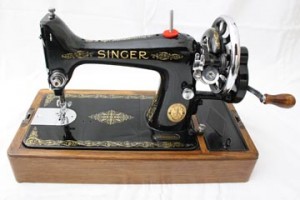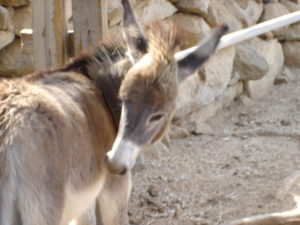While traveling not long ago, I saw a woman toting a sewing machine as her carry-on luggage. No one stopped her.

What is the matter with the Transportation Security Administration? Don’t they realize the dangers inherent in sewing machines? Consider the terminology.
A needle is a small, slender, pointed implement used for sewing or surgical suturing. Have you never punctured yourself while attempting to attach a button or stitch a hem? I inevitably bleed on my blouse or skirt. It’s no wonder the verb needle also means to goad or provoke. I’m often provoked when attempting to sew.
This line of thought led me to consider the analogies used in business and wonder for a moment why sewing analogies don’t show up as often as sports. I assume it is because until recently the majority of business strategists were male, and the majority of sports enthusiasts were also male. “Let’s figure out our game plan so we’ll be in the catbird seat.” I’ve wondered where the catbird seat is and where the phrase came from. It apparently was used in the south to mean an advantageous position, high up where the group of birds that includes the mockingbird choose to sit to sing their tunes. The term was popularized in a story by James Thurber, who cited its frequent use by sports commentator Red Barber.
When things are going well, the company is batting 1000, perhaps with the assistance of a cleanup hitter.
Although these terms are easily understood by most Americans, even those who aren’t fond of sports, the full court press utilized by basketball teams and business strategists may be more obscure. Any of these could be misconstrued by those not familiar with the sport.
Some years ago, former Secretary of State Condaleeza Rice, urging patience to critics of a plan to shut down North Korea’s nuclear program, assured them we were only in the first quarter, with a lot of time left on the clock.
Rice’s language was familiar to others on the Bush White House team, but less to the Asians she was addressing. But that’s okay. Ms. Rice took one for the team and kept her eye on the ball. A good thing, else her gaffe might have become a political football for Democrats to kick around.
Let’s level the playing field and consider the other endeavors and hobbies that we employ to add spice to our words. Want to postpone making a decision? Put it on the back burner. Let your ideas simmer for a while. But don’t stew about the problem and by all means, don’t cook the books. However, if the issue rises to the top of the list, consider your opportunity to curry favor with your manager by putting some heat under it.
 The phrase curry favor has nothing to do with Indian cooking. It comes from an old French morality poem about a vain donkey named Fauvel that deceived the leaders of the court and rose to power. Those who wanted to please him and gain political power stroked and curried Fauvel. A later English moralist changed the term and it evolved to currying favor.
The phrase curry favor has nothing to do with Indian cooking. It comes from an old French morality poem about a vain donkey named Fauvel that deceived the leaders of the court and rose to power. Those who wanted to please him and gain political power stroked and curried Fauvel. A later English moralist changed the term and it evolved to currying favor.
Let’s end where we began, with sewing. Two basic stitches in knitting are the knit stitch and the purl stitch. Is it possible the word purl is related to purloin? Purloin, meaning steal or misappropriate, has its origins in Middle English, meaning to put away or set aside. I’d love to hear from knitters out there if there’s any sense in my thinking. One website referred to the purl as the opposite of a knit stitch. The purl stitch is yin, the dark, shady hillside, to the knit stitch’s yang, the bright, flat open space.
Or am I merely missing a stitch?

